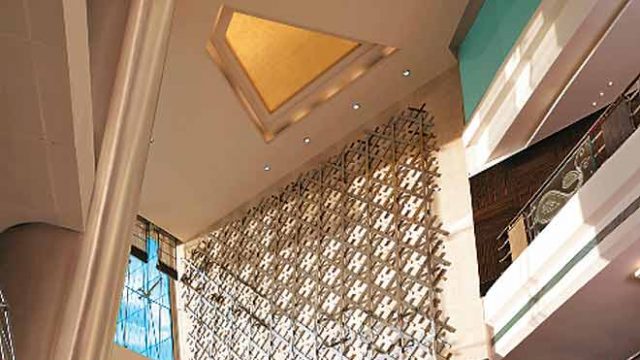I stepped out of a friend’s house in Europe with my luggage at 4am, took a taxi to the railway station, rode a train for three hours to another city, took the metro to the airport, got on a plane, dashed through a layover that was as brief as the departure gate was distant, and landed to walk endlessly down the brown mood-lit corridors of the new international terminal before being loosed into Mumbai at 4:30am, some thirty hours after I’d started.
Not to make too much of the tame hardships of modern travel, but my spirits lifted considerably on seeing my name on a placard. It’s about a twenty-minute drive without traffic from the airport to the Sofitel Mumbai BKC. The seat pouch in front of me holds the latest edition of Outlook Traveller, a sign of either thoughtful planning or plain good taste, either way a good thing. The in-room check-in obviates the whole elbow-propped-on-reception-counter wait, and so I am in bed before the first light of dawn, playing with the remote-controlled blinds and drapes when I lapse into unconsciousness.
Exhaustion, of course. But it’s also the bed, which somehow manages to remain firm while allowing me to sink into it. Ever the assiduous investigative journalist, I will end up taking several naps over the next couple of days to explain this mystery. (Subsequent Internet research will show that I was unwittingly lying on the Sofitel MyBed™, apparently a big deal among mattress and pillow cognoscenti, and that its peculiar physics are due to a layered packing of feathers, which lets you sink in so slowly that you never actually feel unsupported.) I am also told there exists a pillow menu for those unwilling to stick their necks out beyond the excellent default ones.
The hotel staff here acknowledges guests with a namaste and a greeting that I’m unable to parse. I take to making deliberate eye contact wherever I encounter staff simply so I can hear it again. After a whole day and a few dozen greetings later I manage to work out what they are saying: a rapidly rolled off “Bonjour-namaskaar” or “Bonsoir-namaskaar” as the case may be.
The Sofitel brand is associated with over 120 hotels across the world, and is known for adding a French touch to the local flavour wherever it goes. Mumbai BKC is the first Sofitel in India, and their signature hybridisation is nowhere more evident than in the interiors, designed by Isabelle Miaja. Every room has a painting that combines Indian topography with French. Mine had the skyline of a Madurai-like town full of temple gopurams coexisting with a Parisian ruin. Wallpaper, upholstery, carpets and glass etchings are everywhere, often in pretty Hermès-like patterns with motifs of elephants, paisley and vaguely vegetal curlicues. A candle ceremony is performed by hotel staff every evening, perhaps a reminder that Paris was the first city to have street lights — lanterns lit by residents who set out at dusk, candle in hand — under Louis XIV. The Imperial Suite might well be a modern take on a room in his palace.
The hotel is near the Bharat Diamond Bourse, the world’s largest diamond exchange, a fact that features prominently in the hotel’s design. Diamonds are invoked everywhere: the jagged glass façade, every aspect of the Le Bar Diamantaire with its well-stocked wine tower, the profusion of glittering chandeliers all over the premises, the faceted door handles. Even the glass wall separating the bathroom from my bedchamber rises at an angle and lights up blue at the edges. The sheer density of decorative elements might have been overwhelming if not for the fact that they’re playfully done. As it stands, there’s something intriguing no matter where you look, and the Sofitel certainly can’t be accused of the bland plushness that characterises the interiors of far too many hotels. 
The diamond merchant angle may not be unrelated to the fact that Sofitel claims to be the first five-star hotel in Mumbai with a veg-only restaurant, either. It’s called Tuskers, after that other species of high-powered veg diners. The restaurant is packed when I go there for lunch and, judging from overheard conversations, almost everyone here is Gujarati. Chef Jankidas Vaishnav is from Mewar and puts together a pleasing thali, the highlights of which for me are the ker-sangri kofta and the improbable revelation that is a kulfi with paan leaf, gulkand and tutti frutti. To mollify the non-vegetarians, the Artisan lounge, modelled on a Paris deli, stocks an impressive selection of cold cuts and cheeses. It serves cocktails and tapas in the evenings to the accompaniment of a live saxophone player or guitarist and in the day has coffee, pastries and a range of breads. Other restaurants are the north-west frontier-inspired Jyran and the all-day spread at Pondichéry Café.

The pool is inviting, the gym is impressive, but there is a time and a place for everything. So I amble over to the spa, where my masseuse Dawa kneads the travel-tautness out of my body (aided by French Ayurvedic oil, no less), and then it’s time for a nap on MyBed™, the use of which I will not have for much longer.

The information
Location Sofitel Mumbai BKC, C-57 Bandra Kurla Complex, Bandra East; 20min from airport, 3.5km from Bandra station
Accommodation 28 superior rooms, 203 luxury rooms, 40 Club Millésime rooms, 8 junior suites, 22 prestige suites and 1 imperial suite
Tariff Rs 8,800 (superior rooms), 10,000 (luxury rooms), Rs 14,000 (Club Millésime rooms), Rs 18,000 (junior suites), Rs 20,000 (prestige suites), Rs 1, 50,000 (imperial suite); taxes extra
Contact +91-22-61175000, sofitel-mumbai-bkc.com




